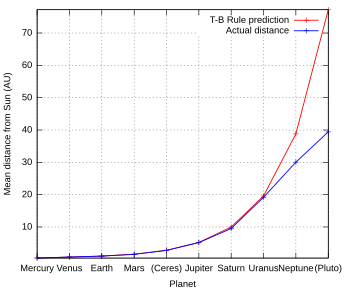vivian: please google binary star systems: first entry: MORE tha HALF of stars in this galaxy are in binary star systems.
Of course not, you said it, it's on you to prove it.
you will notice that no planet deviates more than 5% from its 'bode' position, a divergence common in nature.
First, OF COURSE Earth has a zero deviation, it was the orbital body USED to make all the other calculations. For the rest....
Here are the distances of planets in the Solar System, calculated from the rule and compared with the real ones:

| Planet | k | T-B rule distance (AU) | Real distance (AU) | % error (using real distance as the accepted value) |
|---|---|---|---|---|
| Mercury | 0 | 0.4 | 0.39 | 2.56% |
| Venus | 1 | 0.7 | 0.72 | 2.78% |
| Earth | 2 | 1.0 | 1.00 | 0.00% |
| Mars | 4 | 1.6 | 1.52 | 5.26% |
| Ceres 1 | 8 | 2.8 | 2.77 | 1.08% |
| Jupiter | 16 | 5.2 | 5.20 | 0.00% |
| Saturn | 32 | 10.0 | 9.54 | 4.82% |
| Uranus | 64 | 19.6 | 19.2 | 2.08% |
| Neptune | 128 | 38.8 | 30.06 | 29.08% |
| Pluto 2 | 256 | 77.2 2 | 39.44 | 95.75% |
Notice the deviations? Bode's hypothesis doesn't work.
so look at vibrations, pulsations, acoustics from posiible strings to galaxies.
Random words that mean nothing.
Jupiter by Jove has 0ver 90% of all the planet's masses and is our protector, broke up and gobbled up shoemaker the comet, and keeps asteroids in resonances, except when required to jolt evolution out of it's dangerous ruts.
Random facts paired with randmon words that mean nothing and don't even approach the idea of the ballpark of making sense.
Seriously, you need a good basis in critical thinking or science education. You're so far off base you aren't even wrong.